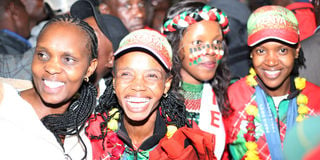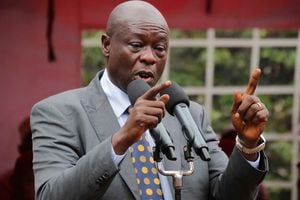Teaching Olympic values in school a wonderful concept

Olympic 10,000m and 5,000m champion Beatrice Chebet (centre) and 1,500m champion Faith Kipyegon are mobbed by fans after their arrival at the Jomo Kenyatta International Airport on August 13, 2024 from the Paris Olympics
What you need to know:
- The idea is to have these values be almost like religion, that people believe in it with conviction and practice it. The Master trainers will be the focal leads in training teachers in the counties to be OVEP educators in their institutions. OVEP can complement the Competence Based Curriculum (CBC) which emphasizes skills, knowledge, attitudes and values.
- The Olympic Movement, will thus in its small way influence and impact society and help in living its vision of “Making the world a better place through sports”.
Kenyan culture is rich and diverse, encompassing a wide range of values that have historically shaped the social norms, community interactions and ethical frameworks across the country.
These values were deeply embedded in the traditional practices, beliefs and communal lifestyles.
Despite the positive aspects of these cultural values, modern influences such as globalization have led to a decline in their relevance especially among the urban dwellers and the youth.
These traditional values are seen as outdated compared to the Western ideals of individualism and material success.
Efforts to instil the correct values in society continue being spread within religious circles, schools, families and social networks. We however need to reinforce and support these efforts.
A simple case of traffic snarl-up on our roads and every space is occupied leading to long hours of waiting for a traffic policeman to solve what common courtesy would have prevented.
Sports add to the discipline and practice of basic values which culture and religion advocate for. Olympism is all about values; its three main values are friendship, respect, and excellence.
This brings us to the concept of Olympic Values Education Programme (OVEP). It is an education programme that uses education and physical activity to promote values-based learning, encouraging the prosocial behaviours and moral development of young people.
Olympic Institutions are values-based. The Olympic Charter spells out the shared set of values for the Olympic Movement called “Fundamental Principles” summarised as follows; “Olympism is a philosophy of life, exalting and combining in a balanced whole the qualities of body, will and mind.
Blending sports with culture and education. Olympism seeks to create a way of life based on the joy of effort, the educational value of good example, social responsibility, and respect for universal fundamental ethical principles.”
With this backdrop, OVEP has five educational themes; the joy of effort, fair play, respect for others, pursuit of excellence and the balance of body will, and mind.
Reflecting on the Olympic Games, these values are placed at the heart of the Games and are reflected in how the Games are organised.
I remember when I started tennis, one of my favourite and admirable codes was “a player shall always use best effort when playing a match”. A player may get a financial penalty for code violation if deemed not to have put forth the best effort. The Olympic value espouses the joy of effort. What a wonderful concept if applied to everything we do in life.
The onus is placed on us, the National Olympic Committee of Kenya, as the representative of the Olympic Movement to promote OVEP in the country. Values-based education can be promoted very well in places that focus on the moral and social development of young people, the major institution being schools.
NOC-K launched the national OVEP programme, which started with training Master Trainers of Trainers drawn from each of the former eight provinces.
The idea is to have these values be almost like religion, that people believe in it with conviction and practice it. The Master trainers will be the focal leads in training teachers in the counties to be OVEP educators in their institutions. OVEP can complement the Competence Based Curriculum (CBC) which emphasizes skills, knowledge, attitudes and values.
The Olympic Movement, will thus in its small way influence and impact society and help in living its vision of “Making the world a better place through sports”.
Mutuku is Secretary General of NOC-K. [email protected]





